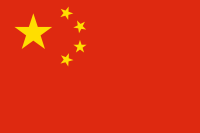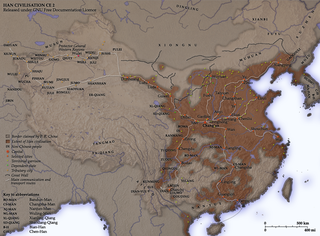- Portal:People's Republic of China
-
- Wikipedia portals:
- Culture
- Geography
- Health
- History
- Mathematics
- Natural sciences
- People
- Philosophy
- Religion
- Society
- Technology
- This portal is for the politics, government, and economy of the People's Republic of China. For the people, history, culture, and geography of China, please see Portal:China.
The People's Republic of China Portal
The People's Republic of China (P.R.C.; Simplified Chinese: 中华人民共和国, Traditional Chinese: 中華人民共和國; pinyin: Zhōnghuá Rénmín Gònghéguó
 listen (help·info), or China), is a country in East Asia. With over one-fifth of the world's population, the PRC has the world's largest population. Due to its large and stable population, its rapidly growing economy, and military spending and capabilities, the PRC is often considered an emerging superpower.
listen (help·info), or China), is a country in East Asia. With over one-fifth of the world's population, the PRC has the world's largest population. Due to its large and stable population, its rapidly growing economy, and military spending and capabilities, the PRC is often considered an emerging superpower.The Communist Party of China (CPC) has led the PRC under a one-party system since the country's establishment in 1949. Despite this, nearly half of the PRC's economy has been privatized in the past three decades under "Socialism with Chinese characteristics." During the 1980s, these economic reforms helped lift millions of people out of poverty, bringing the poverty rate down to 12% from the original one-third of the population. However, due to this mixing of market and planned economies, the PRC is faced with a number of problems associated with each, including unemployment and an increasing rural/urban income gap. Despite these shortcomings, greater prosperity has led to growing Chinese influence in global economic, political, military, scientific, technological, and cultural affairs.
In an ongoing dispute, the PRC claims sovereignty over Taiwan and some nearby islands, which have been controlled by the Republic of China since 1949. The PRC asserts the Republic of China to be an illegitimate and supplanted entity and administratively categorizes Taiwan as a province of the PRC. In contrast, the ROC does not recognize these claims, administering itself as a sovereign country with a democratically elected government and presidency. The term "mainland China" is sometimes used to denote the area under the PRC's rule, but usually excluding the two Special Administrative Regions, Hong Kong and Macau.
Selected article
The Great Proletarian Cultural Revolution (Simplified Chinese: 无产阶级文化大革命; Traditional Chinese: 無產階級文化大革命; pinyin: Wúchǎn Jiējí Wénhuà Dà Gémìng; literally "Proletarian Cultural Great Revolution"; often abbreviated to 文化大革命 wénhuà dà gémìng, literally "Great Cultural Revolution", or even simpler, to 文革 wéngé) in the People's Republic of China was a struggle for power within the Communist Party of China, which grew to include large sections of Chinese society and eventually brought the People's Republic of China to the brink of civil war. It was launched by Communist Party of China Chairman Mao Zedong on May 16, 1966 to regain control of the party after the disasters of the Great Leap Forward had led to a significant loss of his power to rivals such as Liu Shaoqi and Deng Xiaoping. Though Mao himself officially declared the Cultural Revolution to have ended in 1969, the term is today widely used to also include the period between 1969 and the arrest of the Gang of Four in 1976.
Between 1966 and 1968, Mao's principal lieutenants, Vice-Chairman Lin Biao and Mao's wife Jiang Qing, acting on his instructions, organised a mass youth militia called the Red Guards to overthrow Mao's enemies and seize control of the state apparatus. In the chaos and violence that ensued, millions died and millions more were injured or imprisoned. Although the period after 1969 was less chaotic, the leaders of the Cultural Revolution proper remained in power and. R.J. Rummel has estimated that under the Communist Party of China's rule, between the founding of the PRC and the current day, there were 77 million democide deaths, though the figure is disputed. However it is recognised that, whatever the correct figure, millions of deaths occurred during the Cultural Revolution.
The Communist Party of China officially repudiated the Cultural Revolution in 1981, placing responsibility for it on Mao Zedong. According to a Central Committee resolution adopted on June 27, 1981, the Cultural Revolution was carried out "under the mistaken leadership of Mao Zedong who was used by the counterrevolutionaries Lin Biao and Jiang Qing and brought serious disaster and turmoil to the Party and the Chinese people." This official view, which has since become the dominant framework for the Chinese historiography of the Cultural Revolution, enormously simplifies such a complex historical reality - in the opinion of most western historians the official position significantly falsifies it. Attempts in recent years to reopen discussion of the Cultural Revolution inside China have been suppressed.
Selected picture
This map shows the world as it was known to Han Dynasty China in 2 CE. The shaded areas show the extent of Han civilisation. This is based on the existence of settlements under direct Han political authority or military control according to Tan Qixiang (ed.), Zhongguo lishi ditu (中国历史地图集; 1982). The international boundary shown is the border claimed by the People's Republic of China. Compare the territories of the historical Han dynasty and the territories over which the modern Chinese state claims sovereignty. ...ArchiveDid you know...
 ...Archive
...Archive- ... China shares it's borders with fourteen different countries, including Russia, India, Kazakhstan, Vietnam, North Korea and Pakistan?
- ... that China has over 1.3 billion people, with the capital (Beijing) having 19 612 368 people, while the largest city in China is Shanghai, having 23 019 148 people?
- ... the average life expectancy age of a Chinese child at birth is 74.68 years, ranking 95th compared to the rest of the world?
- ... the current chief of state is President Hu Jintao, the 6th president and paramount leader of the People's Republic of China?
- ... the head of government in China is the Premier? The current premier of China is Wen Jiabao. A premier has one executive vice premier (currently Li Keqiang) and three vice premiers (currently Zhang Dejiang, Hui Liangyu and Wang Qishan).
- ... that video games in the People's Republic of China are a massive growing industry?
- ... that Richard Loo is one of the most familiar Asian character actors in American films of the 1930s and 1940s?
- ... that Chen Shuda, an imperial prince of the Chen Dynasty, served in Sui Dynasty and Tang Dynasty and held influential positions after his country was taken over?
People's Republic of China news
News on China at Wikinews
- October 22: Chinese girl who was hit and run by two drivers, ignored by eighteen people, dies
- September 10: Out of space in outer space: Special report on NASA's 'space junk' plans
- August 17: Chinese human rights activist faces trial
- August 16: Wikinews interviews Chinese-American martial artist Alfred Hsing
- August 13: China sends its first aircraft carrier to sea
- July 24: Train accident in China kills at least 43
- July 11: China's consumer prices rise to a three-year high in June as food prices soar 14.4 percent
- July 7: Bahamas become fourth country to ban shark fishing
- July 3: Philippine Foreign Secretary Del Rosario to visit China amid South China Sea territorial dispute
- June 28: Chinese political dissident Hu Jia freed as Chinese Premier Wen visits Britain
Categories
- Provinces: Anhui • Fujian • Gansu • Guangdong • Guangxi • Guizhou • Hainan • Hebei • Heilongjiang • Henan • Hubei • Hunan, Jiangsu • Jiangxi • Jilin • Liaoning • Qinghai • Shaanxi • Shandong • Shanxi • Sichuan • Yunnan • Xinjiang • Xizang (Tibet) • Zhejiang • Taiwan (claimed)
- Other: Education • Environment • Human rights • Science and technology • Public security
Workgroups

- Arts and entertainment
- Cinema
- Geography
- Cities
- Hong Kong
- Hong Kong Transport
- Macau
- Hong Kong
- Provinces
- see also WikiProject Taiwan
- Autonomous Regions
- Tibet
- Uyghurs of Western China
- Cities
- Government
- Politics
- History
- Three Kingdoms
- Military history
- Language
- Surnames
- CJKV task force
- Media
- Images
- Maps
- Images
- Misc.
- Taoism
- Transportation
- Christianity in China
Related portals
Regional:
China • Hong Kong • Macau • Republic of China • AsiaOther:
Christianity in ChinaTasks you can do
 Complete list | Chinese noticeboard
Complete list | Chinese noticeboard- Wikipedia:WikiProject China/Chinese cities workgroup
- Wikipedia:WikiProject China/Chinese provinces workgroup
- Requests: Economic development in China, Lingnan architecture, Contemporary Chinese art, More...
- Expand: Cai Lun, Bashidang, Chang Dai-chien, China National Ethnic Song and Dance Ensemble, Chinese folk religion, Culture of China, Min Bei, Government Information Office, Zhao Rugua, Linfen
- Cleanup: Xinhai Revolution, Siege of Tuyen Quang, Battle of Tzeki, Politics of Manchukuo
- Copyedit: Wang Shiwei, Transfer of the sovereignty of Macau
- Images: Category:Wikipedia requested photographs in China
- Portal: Fill in Anniversaries, update Did you know?, suggest Selected articles and pictures, maintain Portal:People's Republic of China and Portal:Republic of China (shared task with WikiProject Taiwan).
- References: Add references to Unreferenced BLPs.
- Translation: Please visit the Chinese translation department and the Chinese transwiki project for more details.
- Verify: Nanjing University, Mao suit
People's Republic of China topics
Provinces Anhui, Fujian, Gansu, Guangdong, Guangxi, Guizhou, Hainan, Hebei, Heilongjiang, Henan, Hubei, Hunan, Jiangsu, Jiangxi, Jilin, Liaoning, Qinghai, Shaanxi, Shandong, Shanxi, Sichuan, Yunnan, Xinjiang, Xizang, Zhejiang People Education in the People's Republic of China | Human rights | Police | Religion Infrastructure Communications | Railways | Transportation | Water supply and sanitation Other Environment | Science and Technology Associated Wikimedia
Categories:- People's Republic of China
- Asian portals
- China portals
Wikimedia Foundation. 2010.


